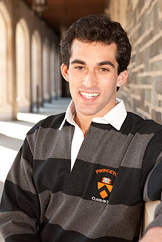 |
CSF Update, March, 2011The summer of 2011 is shaping up to be one of the most exciting in the history of the Class of 1969 Community Service Fund. The 492 applicants applying for 75 available PICS internships formed the largest pool of applicants ever seen by the CSF since its inception in 1996. New internships sponsored by the Class of 1975 and the Princeton Club of Philadelphia are now offered through the PICS program broadening the opportunities available to Princeton students. In addition to those sponsored by the Classes of 1970 and 1977 and the Princeton Clubs of Chicago and St. Louis and the Princeton Association of New England. With the help of alumni from the classes of 1969, 1970, 1977, 2001, 2006, as well as ’69 spouses, interviews were conducted over two weekends in February. ’69 interviewers included Anne and Bill Charrier, Bruce Eckman, Jim Floyd, Bruce Freeman, Chuck Freyer, Kathy Gaffney, Jim Gregoire, Bruce Hillman, Steve Houck, George Hritz, Chip and Marilyn Jerry, Rick Kitto, Jeff and Maureen Marston, Clay McEldowney, Sandy Rea, Hayden Smith, Jeff Sprowles, Tom Weidner, and Bob Wolfe. Organizations are in the process of reviewing applicants and have already begun to make offers. As of March 25, 68 students have already received their summer placement. The locations of the internships range from Bermuda to Washington State, and are based in large urban centers such as New York City and Chicago, as well as rural areas in Colorado and Minnesota. The internships are in organizations dedicated to education, legal and medical services, environmental protection, community development, and public policy. A list of these student opportunities can be found at www.princetoninternships.org Martin Kitto The rewards of serviceThe CSF has just received from The County Executive of Montgomery County, Maryland, an award to Princeton Internships in Civic Service "in Recognition and Appreciation" of your support of Andy Lowy, an intern with the County Executive's Office of Community Partnerships in the Summer of 2010. Andy's exceptional "Sustainable Community Food Initiative" report provides a road-map for transforming the way food is grown, processed, distributed, and consumed in Montgomery County. Andy's work stands proudly in the rich tradition of "Princeton in the Nation's Service."
Shaina Watrous '14 -- an example of service
Shaina Watrous ’14, 2009-10 Bridge Year Scholar:
I live really close to Princeton, so when I was little, I would come here in the morning with my grandma and walk around and see all the buildings. I really wanted to go here. And then senior year, they let me in. And as soon as I got in, that night, my brother sent me an e-mail and the subject line was just "Do This!” And then it was a link to the Bridge Year Program. Bridge Year’s purpose is to send students abroad for nine months of service work. You defer coming to your first year at Princeton. So I was Class of 2013, and I just became the Class of 2014. There are really good service placements in every country. I was especially excited about the service opportunities in India, because I had seen movies about kids living in brothels. So I was excited to see that one of the organizations in India was one that was combating sex trafficking. I was working with a non-governmental organization called Guria Sansthan. I worked partially in their school in the red;light district. The school was for children of the sex workers, also some of the children of the pimps, you know, anyone that was living in this kind of environment. I would help them with their math homework; I would teach them English. And they were so excited to learn these things. They just need to see these role models. Just by my coming there and showing that, you know, someone is outside of this world that’s the only world that they know. That was so important for them to see. There was one in particular, this girl – her name was Ruchy. She had this one outfit, that was the only thing that she had, and I watched it disintegrate over the months. She had it really rough, I mean, any kid born into the red;light district is going to have a difficult life. And yet, she was so hopeful and such a happy person. It was so inspiring for me to see someone like that. I just never would have thought to make service work a part of my life until I went to India. It’s part of my world now, you know, I can’t abandon it. Coming back to Princeton, I feel like I have a responsibility to the kids that I was working with. I’m going to school for 60 kids that I met in India. I’m going to school to try to make life better for them. I had this necklace made in India that says "Apna sapna swayam bano" and it means "Become your dream.” I have this dream of becoming the kind of person that can help kids like this. Rosen, Thomson-DeVeaux named Pyne Prize winnersby Eric Quiñones
Princeton seniors Alex Rosen and Amelia Thomson-DeVeaux will share the University's 2011 Moses Taylor Pyne Honor Prize, the highest general distinction conferred on an undergraduate.
The Pyne Honor Prize, established in 1921, is awarded to the senior who has most clearly manifested excellent scholarship, strength of character and effective leadership. Previous recipients include the late Princeton President Emeritus Robert F. Goheen, former U.S. Sen. Paul Sarbanes and current U.S. Supreme Court Justice Sonia Sotomayor.
Rosen, who is from Allentown, Pa., is majoring in economics and pursuing a certificate in global health and health policy. He has served for four years as president of Princeton's class of 2011 and is chair of the University's Honor Committee, which investigates violations of the Honor Code for undergraduates. After graduating from Princeton, Rosen plans to attend medical school and become a physician.
"I feel incredibly honored to be selected for the Pyne Prize, and I don't think I can express how much this award means to me," he said. "I'm extremely grateful to all of my classmates, teachers and advisers, who have made my Princeton experience what it is so far."
Rosen has focused his junior and senior independent academic work on issues combining his interests in economics and health care. For his senior thesis, he is investigating how patient outcomes are affected by hospital ownership -- private for-profit, private not-for-profit, or public -- based on a study of nationwide data.
"This is a very important area of inquiry both from scientific and public policy standpoints," said his thesis adviser Nancy Reichman, a visiting professor of economics at Princeton and a professor of pediatrics at Robert Wood Johnson Medical School. "Alex will be making a huge contribution by conducting a contemporary and comprehensive analysis of the effects of hospital ownership on patient outcomes. … I believe this study will be publishable in a top health economics journal or even in more general-interest outlets."
Rosen said his career aspiration is to "make a positive impact on health care access and delivery." This goal has been shaped by his academic work at Princeton as well as his experience last summer as a clinical research intern at Children's National Medical Center in Washington, D.C., a position he obtained through the Princeton Internships in Civic Service program.
Rosen's interest in health issues dates back to his high school years, when he founded Tennis Friends, an Allentown-based group that provides free tennis clinics to teens with developmental disabilities. He continues to co-direct the organization.
"Both in his academic work and in community service, Alex addresses pressing sociomedical problems and looks for alternative ways of understanding and intervening," said João Biehl, Princeton's Susan Dod Brown Professor of Anthropology and co-director of the Program in Global Health and Health Policy. "He possesses a comprehensive and detailed knowledge of research trends and methods across disciplines and is able to combine these to produce innovative knowledge that both addresses macro-health issues and is sensitive to people's issues on the ground."
Rosen has been active in a variety of leadership and governance roles during his time at Princeton, most notably as a four-term class president.
"Serving as class president certainly has been a transformative experience for me," he said. "It has allowed me to get to know and to learn from so many members of my class, all of whom are extraordinarily talented."
In addition to his leadership of the class and the Honor Committee, Rosen is a residential college adviser in Whitman College; a member of the executive committee of the Princeton Premedical Society; a member of the governance committee of the Council of the Princeton University Community, a University-wide advisory panel; and a member of the executive committee of the University's Alumni Council.
Christina Davis, director of student life at Whitman College, said of Rosen, "He's been a great support and resource for advisees and has encouraged many of them to get involved both in Whitman and in the greater University community. Alex is extremely mature, responsible and has been nothing but a pleasure to supervise."
|
 |
Powered by Bonfire™ - a Reunion Technologies Solution.

 Shaina Watrous '14 was chosen as one of the Summer, 2011, interns. She will be working at Legal Services of New Jersey. But this isn't Shaina's first experience with service!
Shaina Watrous '14 was chosen as one of the Summer, 2011, interns. She will be working at Legal Services of New Jersey. But this isn't Shaina's first experience with service!  They were recognized at a luncheon during Alumni Day on campus Saturday, Feb. 26.
They were recognized at a luncheon during Alumni Day on campus Saturday, Feb. 26.